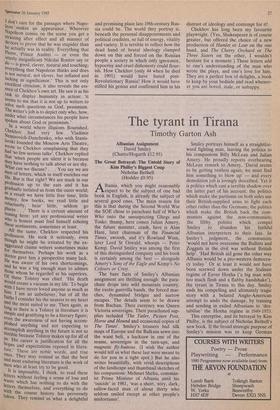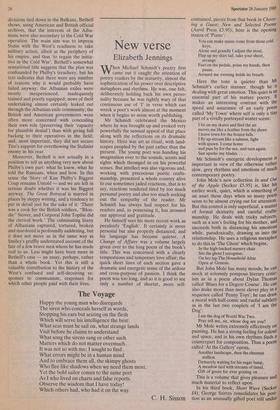The tyrant in Tirana
Timothy Garton Ash
Albanian Assignment David Smiley (Chatto/Hogarth £12.95) The Great Betrayal: The Untold Story of Kim Philby's Biggest Coup Nicholas Bethell (Hodder £9.95)
Albania, which you might reasonably expect to be the subject of one bad book in English, is already the subject of several good ones. The main reason for this is that during the Second World War the SOE chose to parachute half of Who's Who onto the unsuspecting Ghegs and Tosks: thump, here comes Julian Amery, the future minister, crash, here is Alan Hare, later chairman of the Financial Times, swoosh, and it's Rowland Winn, later Lord St Oswald, whoops — Peter Kemp. David Smiley was among the first of this distinguished company and his book is certainly among the best — alongside Amery's Sons of the Eagle and Kemp's No Colours or Crest.
The bare facts of Smiley's Albanian assignment are thrilling enough: the para- chute drops into wild mountain country, the exotic guerrilla bands, the forced mar- ches, dynamited bridges and narrow escapes. The details seem to be drawn from Buchan. Their currency was Queen Victoria sovereigns. Their parachuted sup- plies included 'The Taller, Picture Post, Horse and Hound and occasional copies of The Times'. Smiley's trousers had silk maps of Europe and the Balkans sewn into the waist belt, a hacksaw in one of the seams, sovereigns in the turn-ups, and magnetic fly-buttons. (I wish the author would tell us what these last were meant to do for you in a tight spot.) But he also writes beautifully, with vivid, descriptions of the landscape and thumbnail sketches of his companions: Mehmet Shehu, commun- ist Prime Minister of Albania until his 'suicide' in 1981, 'was a short, wiry, dark, sallow-faced man of about thirty who seldom smiled except at other people's misfortunes'.
Smiley portrays himself as a straightfor- ward fighting man, leaving the politics to his companions Billy McLean and Julian Amery. He proudly reports overhearing McLean remark to Amery, 'David seems to be getting restless again; we must find him something to blow up' — and every demolition job is lovingly described. Yet it is politics which cast a terrible shadow over the latter part of his account: the politics which make the partisans on both sides use their British-supplied arms to fight each other rather than the Germans; the politics which make the British back the com- munists against the non-communists; the filthy politics which compel Smiley to abandon his faithful Albanian interpreters to their fate. In Smiley's judgment, the communists 'would not have overcome the Ballists and Zoggists in the civil war without British help'. 'Had British aid gone the other way Albania would be a pro-western democra- cy today.' Or at least it would not have been screwed down under the Stalinist regime of Enver Hoxha ('a big man with too much flesh and a flabby handshake'), the tyrant in Tirana to this day. Smiley ends his compelling and ultimately tragic story with a belated Anglo-American attempt to undo the damage, by training and sending in exiled Albanians to 'des- tabilise' the Hoxha regime in 1949-1953.
This enterprise, and its betrayal by Kim Philby, is the subject of Nicholas Bethell's new book. If the broad strategic purpose of Smiley's mission was to keep German
divisions tied down in the Balkans, Bethel! shows, using American and British official archives, that the interests of the Alba- nians were also secondary to the Cold War operation. The main aim was to impress Stalin with the West's readiness to take military action, albeit at the periphery of his empire, and thus 'to regain the initia- tive in the Cold War'. Bethell's somewhat sensational title suggests that the plan was confounded by Philby's treachery, but his text indicates that there were any number of reasons why it would probably have failed anyway: the Albanian exiles were mostly inexperienced, inadequately trained and poorly equipped; news of their undertaking almost certainly leaked out through the Albanian exile community; the British and American governments were often more concerned with concealing their own role (preserving their 'capacity for plausible denial') than with giving full backing to their operatives in the field; and, most important, they did not secure Tito's support for overthowing the Stalinist enemy in his rear. Moreover, Bethel) is not actually in a position to tell us anything very new about Philby's own part: what he knew, what he told the Russians, when and how. In this sense the Story of Kim Philby's Biggest Coup remains Untold — and we are left in serious doubt whether it was his Biggest anyway. The Great Betrayal is marred in places by sloppy writing, and a tendency to put in detail just for the sake of it: 'There was a cook for the British soldiers, "Blon- die" Stover, and Corporal John Topliss did the clerical work.' The culminating litany of Albanians captured, tortured, broken and murdered is profoundly saddening, but it does not move us in the same way as Smiley's gruffly understated account of the fate of a few brave men whom he has made real to us. Less might have been more in Bethell's case — an essay, perhaps, rather than a whole book. Yet this is still a valuable contribution to the history of the West's confused and self-deceiving re- sponses to communism; responses for which other people paid with their lives.











































 Previous page
Previous page